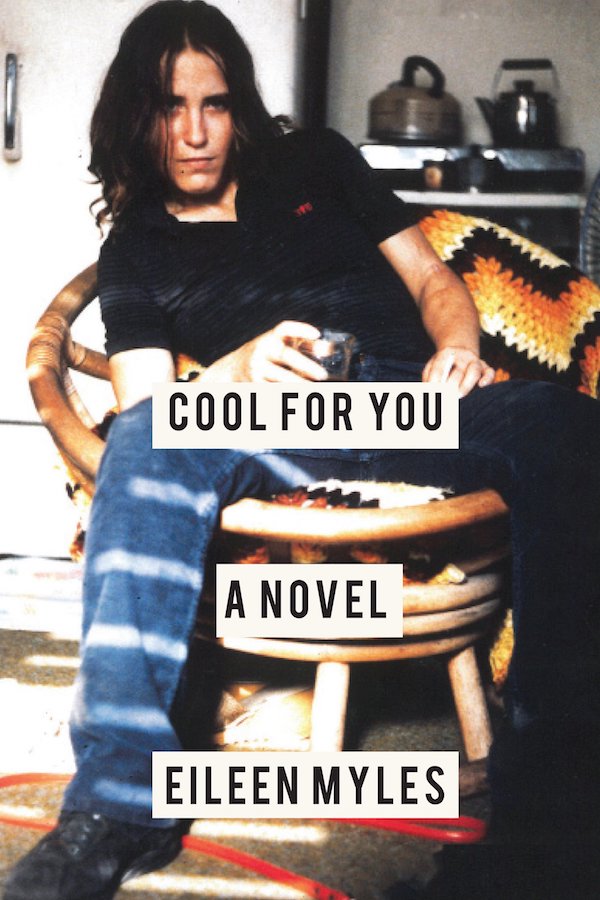Cool for You (a novel)

from Cool for You
11.
In North Building they used those pale green, yellow, light almost grey-blue bowls — plastic ones that the government buys and distributes everywhere in America so that everyone is aware of institutional eating. The clank of it. The metal soupspoon clucks at the bowl. The people who never go outside eat the only thing that keeps them alive and sometimes they just starve for days. Not eating was not considered a negative behavior, and residents were often either out and out pigs or skinny and starving — sticks. Angry waving sticks by the window.
Huge vats of watery oatmeal would be rolled in every day at 12:15. Usually my own stomach would be growling and I’d hear the bluster and smell the stink in the halls. It was food. Watery oatmeal. It reminded me of a sweater. A xerox of a sweater you’re handed when you need to get warm. It wasn’t even tweedy this oatmeal. It was blue grey brown. It was beige, it was grey. It picked up the plastic lights from the side of the bowl. It shimmered like the big metal tubs it came in. Where do they keep the Kennedy girl, I wondered each morning. Does she eat this shit. It didn’t come with milk. Where’s the milk, George? I asked on the first day.
The milk’s in it, George’s eyes twinkled. George Barlow. A wonderful man. We had long conversations in the clothing room. We’d be figuring out the boys’ outfits early in the day. Grab some pants, a pair of socks. George had this twinkle in his eye and a slightly moist look around his lips. He was incredibly old. 36. He had been at Fernald all his life. He said they decided he was a little stupid when he started school and they sent him here and nobody ever minded and nobody ever found out. Your family, I inquired. One more mouth to feed. George’s eyes twinkled as he unknotted socks. He gestured at himself innocently. I didn’t know any better. I just figured I was stupid too.
After the big shakeup in the sixties, he said, they noticed that I knew what was going on. If anyone asked me anything I’d tell them. Usually they didn’t ask. They assumed I was dumb. One of the few attendants a few years ago began to teach me to read. It’s not so hard. I didn’t know that was what they were doing. The letters. His eyes twinkled like he meant the letters were doing something. Oh yeah, I said. That.
I’ll probably get out of here, he said, looking around. He smokes a pipe, George. And he eats the food. Where’s the milk, George? The milk’s in it, he told me. Mixed in. It’s easier. They don’t mind, he assures. I saw a big fat man in overalls pouring it down. He sat in a huge high chair. With the bowl to his lips, looking. Eyeing his friends.
No sugar, I asked George. It’s in the coffee, he gleamed. Lifting a see-through plastic cup of coffee and pouring some onto Peter’s cereal. Thanks George, Peter slurred. Some mornings I wanted their oatmeal but I had already been there too long. I mean you could try the oatmeal in your first week when you didn’t know anything yet, you could get away with tasting it then, being dumb.
I wanted it. I only seriously considered having it when another attendant was in the room because if I was alone with them and I had a bowl of it I would be one of them. If I had it when George was there it would be like being one of them because he was one of them even though he could talk about it. Once in a while I would have half a cup of their coffee in one of the plastic cups. “See-through” but really you couldn’t because they were so old.
They had been washed by big machines, again and again, tall plastic cups that had lived their lives in institutions so now instead of being see-through they were “scratch.” That was their color. With ridges for a safety grip. The coffee was beige, sand-colored, grey. It was blue-grey coffee, tan. Flavored with milk, watered down, not much not real milk. Probably government surplus powdered milk, probably that. So it was grey, like endless land. I drank a half a cup of the stuff. They looked at me, disgusted, whoever I was working with, but they’d done it too, we’d all done it one morning or another, drank their coffee as if it were ours.
Is there a recipe book for everyone? In America, when it comes down to that: here’s something for everyone, a book or a cup of coffee, a bowl of oatmeal, that not you or I or anyone we know would ever want to eat, but food that anyone would eat when they had finally been determined to be in that position that they would eat anyone’s food. I don’t mean eating from the dumpster. I mean the mechanical lunches you got in school. Those vegetables no one wanted because you could see they had been prepared for anyone. Extra food. To think you might wind up eating it one day, looking around, the day you forgot who you were.
press
available from
Copyright © 2021 Eileen Myles